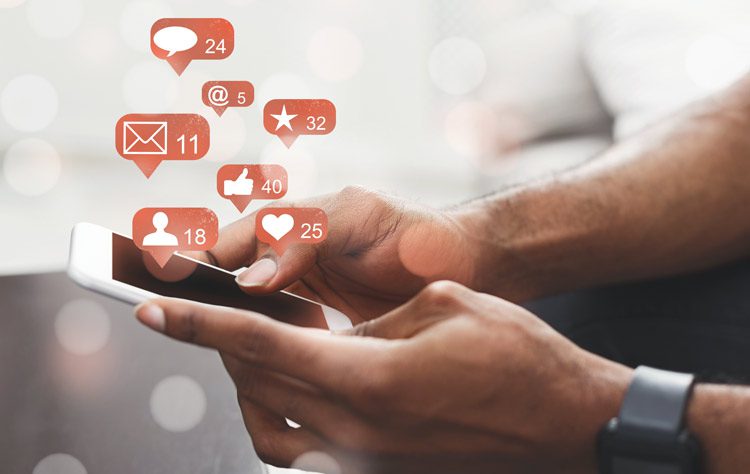Have you ever posted something on social media that you thought was particularly clever? Or maybe announced a piece of news of which you were pretty proud? Maybe posted a photo of your kid or your significant other and done a bit of humble bragging?
Social Media & Your Feelings
If so, you may have found yourself frequently checking the post to see how many likes it collected. You might feel happy if lots of people reacted to your post. On the other hand, you might feel disappointed or ignored if very few people responded.
At first, you might not even notice these feelings. But it turns out that social media can have a powerful effect on everything from our mood to our sense of self-worth. And if those feelings are trending in a negative direction, they can lead to mental health issues. In some cases, negative experiences on social media can even contribute to or worsen the development of a substance use disorder—and for a person in recovery, a bad social media experience can increase the risk of a relapse.
So does that mean you should erase all your social media accounts? Not necessarily (though it is certainly true that some people have found that to be beneficial, even if they only disconnect for a limited period of time). After all, social media can help us connect with others in meaningful ways. But it is probably a good idea to think carefully about how—and how much—you are interacting with your social media accounts.
Benefits of Less Social Media Use in Recovery
There are plenty of reasons to consider reducing your social media use. For our purposes here, we will focus on those directly related to supporting your recovery and maintaining your sobriety.
For example, less time spent on social platforms may mean less time spent comparing yourself to others or obsessing over activities you are missing out on. It may mean less time spent scrolling through pictures of your friends out drinking. If you are in recovery, you don’t need to spend your time interacting with photos that might lead to cravings and thereby threaten your sobriety.
But even if you never run across pictures of people drinking, you might fall prey to the temptation to compare your situation to that of your friends or family. Because we tend to curate the best possible image of ourselves online, it may seem like all of your friends are more successful, wealthier, and happier than you are. In some cases, that might be true. Odds are, however, that you are not seeing the complete picture of your friends’ lives. Everyone has challenges and disappointments, so comparing yourself to what you encounter on social networks is not a helpful activity.
Limiting your social media use may also help you focus on living in the present rather than ruminating about the past (that “memories” section of a social media site, for example, may not be the best place for you if you are in recovery) or worrying about the future. The fights about news and politics can sure make the future seem scary, which can lead to anxiety and cravings that might be difficult to manage.
Find the Right Balance for You
How can you find the sweet spot that allows you to enjoy participating in social media without undermining your recovery? Here are some things to consider:
- Set a time limit: You might find that scheduling your social media time and limiting it to, say, 30 minutes a day helps you enjoy that time more and obsess less about things you see online. Making social media a part of your schedule rather than a constant distraction from your schedule is a positive change.
- Disconnect from people who aren’t healthy for you: Block or unfriend people connected to your past use of drugs or alcohol. Disconnect from anyone who makes you feel bad about yourself or increases your anxiety. Resist the temptation to get into ugly arguments—with friends or strangers. Curate your social network experience so it builds you up rather than tearing you down.
- Think of your social media posts as a diary: If you post for yourself rather than for others, you may be less focused on how many people do or don’t interact with your posts. With this mindset, you can think of any interactions that do occur as happy bonuses rather than the central purpose of your social media activity.
We Are Confident You Will Like Us & the Care We Provide
At Wooded Glen Recovery Center, we know that life is a lot more than what happens in your social network feeds. If your life has gotten away from you and you need help with a substance use disorder, we offer the kind of compassionate and evidence-based care that can help you reclaim it. Together, we can help you get sober and build a foundation for lasting sobriety. Of course, whether you share that success on your social media is entirely up to you.

